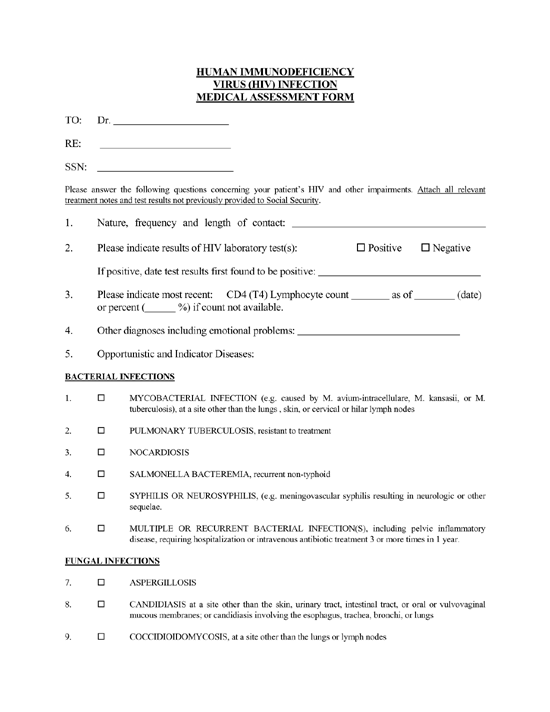Can I Get Social Security Disability Benefits for HIV / AIDS?
- How Does the Social Security Administration Decide if I Qualify for Disability Benefits for HIV / AIDS?
- About HIV Infection and Disability
- Winning Social Security Disability Benefits for HIV / AIDS by Meeting a Listing
- Residual Functional Capacity Assessment for HIV / AIDS
- Getting Your Doctor’s Medical Opinion About What You Can Still Do
Residual Functional Capacity Assessment for HIV / AIDS
What Is RFC?
If your HIV infection is not severe enough to meet or equal a listing at Step 3 of the Sequential Evaluation Process, the Social Security Administration will need to determine your residual functional capacity (RFC) to decide whether you are disabled at Step 4 and Step 5 of the Sequential Evaluation Process. RFC is a claimant’s ability to perform work-related activities. In other words, it is what you can still do despite your limitations.
Physical and Mental RFC
An RFC for physical impairments is expressed in terms of whether SSA believes you can do heavy, medium, light, or sedentary work in spite of your impairments. The lower your RFC, the less the SSA believes you can do.
An RFC for mental impairments is expressed in terms of whether Social Security Administration believes a claimant can do skilled, semi-skilled, or unskilled work in spite of impairments, or whether the claimant cannot even do unskilled work.
Activities of Daily Living
If your condition is not severe enough to meet or equal a listing, it is very important to provide the Social Security Administration with your symptoms and specific examples about how those symptoms limit your activities of daily living.
Many people with HIV infection have no symptoms before the onset of opportunistic diseases. Some complain of nonspecific symptoms of malaise and fatigue before the onset of any major physical impairment or opportunistic infection. To some extent their activities of daily living may be reduced, but not markedly limited. If you have no symptoms and your immune system is intact, you will not be limited in the work you can do and would not require any RFC. However, if your disease is more advanced and you have medically severe associated symptoms, they could warrant an RFC reduction.
Effect of Medications
The Social Security Administration should take into account that your medications alone can produce extreme fatigue. You may have mental problems either from the effects of HIV directly on the brain, drug side-effects, or impairments arising in association with AIDS. If there is any question about your mental state, family members, friends, or other individuals in contact with you should be asked about symptomatic problems you may be having and how they are functionally limiting.
Ability to Walk, Lift and Carry
If your condition is close to listing-level severity, you should receive no higher than a sedentary RFC. The most significant question is “Can you stand or walk 6 – 8 hours daily?” If not, your RFC will reduce to sedentary work. You should also be asked about your ability to lift and carry. It can be helpful if you can name objects of known weight that you can no longer lift, and activities requiring a particular amount of lifting and carrying that you can no longer do.
Weight Loss
The importance of providing the Social Security Administration with your current weight cannot be over-emphasized. Malnutrition and accompanying easy fatigability can significantly limit exertional capacities even without consideration of other limiting factors.
Getting Your Doctor’s Medical Opinion About What You Can Still Do
Your Doctor’s Medical Opinion Can Help You Qualify for Social Security Disability Benefits
The Social Security Administration’s job is to determine if you are disabled, a legal conclusion based on your age, education and work experience and medical evidence. Your doctor’s role is to provide the Social Security Administration with information concerning the degree of your medical impairment. Your doctor’s description of your capacity for work is called a medical source statement and the Social Security Administration’s conclusion about your work capacity is called a residual functional capacity assessment. Residual functional capacity is what you can still do despite your limitations. The Social Security Administration asks that medical source statements include a statement about what you can still do despite your impairments.
The Social Security Administration must consider your treating doctor’s opinion and, under appropriate circumstances, give it controlling weight.
The Social Security Administration evaluates the weight to be given your doctor’s opinion by considering:
- The nature and extent of the treatment relationship between you and your doctor.
- How well your doctor knows you.
- The number of times your doctor has seen you.
- Whether your doctor has obtained a detailed picture over time of your impairment.
- Your doctor’s specialization.
- The kinds and extent of examinations and testing performed by or ordered by your doctor.
- The quality of your doctor’s explanation of your impairment.
- The degree to which your doctor’s opinion is supported by relevant evidence, particularly medically acceptable clinical and laboratory diagnostic techniques.
- How consistent your doctor’s opinion is with other evidence.
When to Ask Your Doctor for an Opinion
If your application for Social Security disability benefits has been denied and you have appealed, you should get a medical source statement (your doctor’s opinion about what you can still do) from your doctor to use as evidence at the hearing.
When is the best time to request an opinion from your doctor? Many disability attorneys wait until they have reviewed the file and the hearing is scheduled before requesting an opinion from the treating doctor. This has two advantages.
- First, by waiting until your attorney has fully reviewed the file, he or she will be able to refine the theory of why you cannot work and will be better able to seek support for this theory from the treating doctor.
- Second, the report will be fresh at the time of the hearing.
But this approach also has some disadvantages.
- When there is a long time between the time your attorney first sees you and the time of the hearing, a lot of things can happen. You can improve and go back to work. Your lawyer can still seek evidence that you were disabled for a certain length of time. But then your lawyer will be asking the doctor to describe your ability to work at some time in the past, something that not all doctors are good at.
- You might change doctors, or worse yet, stop seeing doctors altogether because your medical insurance has run out. When your attorney writes to a doctor who has not seen you recently, your attorney runs the risk that the doctor will be reluctant to complete the form. Doctors seem much more willing to provide opinions about current patients than about patients whom they have not seen for a long time.
Here is an alternative. Suggest that your attorney request your doctor to complete a medical opinion form on the day you retain your attorney. This will provide a snapshot description of your residual functional capacity (RFC) early in the case. If you improve and return to work, the description of your RFC provides a basis for showing that you were disabled for a specific period. If you change doctors, your attorney can get an opinion from the new doctor, too. If you stop seeing doctors, at least your attorney has one treating doctor opinion and can present your testimony at the hearing to establish that you have not improved.
If you continue seeing the doctor but it has been a long time since the doctor’s opinion was obtained, just before the hearing your attorney can send the doctor a copy of the form completed earlier, along with a blank form and a cover letter asking the doctor to complete a new form if your condition has changed significantly. If not, your attorney can ask the doctor to send a one-line letter that says there have been no significant changes since the date the earlier form was completed.
There are times, though, that your attorney needs to consider not requesting a report early in the case.
- First, depending on the impairment, if you have not been disabled for twelve months, it is usually better that your attorney wait until the twelve-month duration requirement is met.
- Second, if you just began seeing a new doctor, it is usually best to wait until the doctor is more familiar with your condition before requesting an opinion.
- Third, if there are competing diagnoses or other diagnostic uncertainties, it is usually best that your attorney wait until the medical issues are resolved before requesting an opinion.
- Fourth, a really difficult judgment is involved if your medical history has many ups and downs, e.g., several acute phases, perhaps including hospitalizations, followed by significant improvement. Your attorney needs to request an opinion at a time when the treating doctor will have the best longitudinal perspective on your impairment.
Medical Opinion Forms
Medical opinion forms can be great time savers for both your attorney and your doctor, but they must be used with care. Forms may not be appropriate at all in complex cases; and they need to be supplemented in many cases so that all issues are addressed. The best forms are clear and complete but not too long.
When the time is right, here is a form for your disability attorney to use:
Continue to the full version of the HIV Infection Medical Assessment Form.
Go back to Winning Social Security Disability Benefits for HIV / AIDS by Meeting a Listing.



